九年级英语上册 Unit 3 Teenage problems Integrated skills 1练习(无答案)(新版)牛津版
牛津译林版英语九年级上册 Unit 3 《Teenage problems.》 教学设计5
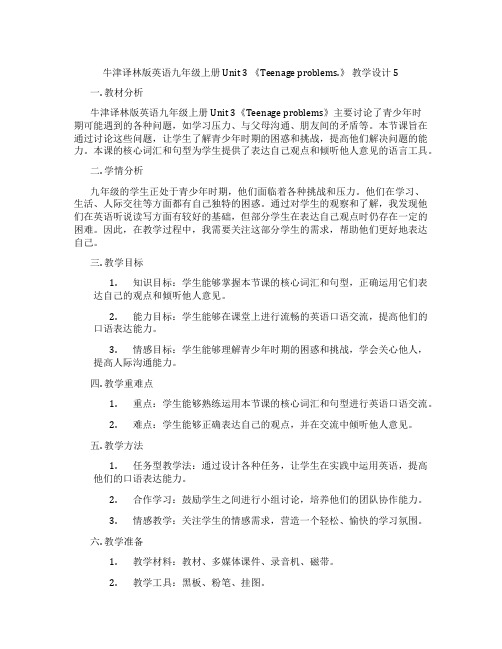
牛津译林版英语九年级上册 Unit 3 《Teenage problems.》教学设计5一. 教材分析牛津译林版英语九年级上册Unit 3《Teenage problems》主要讨论了青少年时期可能遇到的各种问题,如学习压力、与父母沟通、朋友间的矛盾等。
本节课旨在通过讨论这些问题,让学生了解青少年时期的困惑和挑战,提高他们解决问题的能力。
本课的核心词汇和句型为学生提供了表达自己观点和倾听他人意见的语言工具。
二. 学情分析九年级的学生正处于青少年时期,他们面临着各种挑战和压力。
他们在学习、生活、人际交往等方面都有自己独特的困惑。
通过对学生的观察和了解,我发现他们在英语听说读写方面有较好的基础,但部分学生在表达自己观点时仍存在一定的困难。
因此,在教学过程中,我需要关注这部分学生的需求,帮助他们更好地表达自己。
三. 教学目标1.知识目标:学生能够掌握本节课的核心词汇和句型,正确运用它们表达自己的观点和倾听他人意见。
2.能力目标:学生能够在课堂上进行流畅的英语口语交流,提高他们的口语表达能力。
3.情感目标:学生能够理解青少年时期的困惑和挑战,学会关心他人,提高人际沟通能力。
四. 教学重难点1.重点:学生能够熟练运用本节课的核心词汇和句型进行英语口语交流。
2.难点:学生能够正确表达自己的观点,并在交流中倾听他人意见。
五. 教学方法1.任务型教学法:通过设计各种任务,让学生在实践中运用英语,提高他们的口语表达能力。
2.合作学习:鼓励学生之间进行小组讨论,培养他们的团队协作能力。
3.情感教学:关注学生的情感需求,营造一个轻松、愉快的学习氛围。
六. 教学准备1.教学材料:教材、多媒体课件、录音机、磁带。
2.教学工具:黑板、粉笔、挂图。
七. 教学过程1.导入(5分钟)利用多媒体展示一些青少年时期常见的问题,如学习压力、与父母沟通等。
引导学生谈论这些问题,激发他们的兴趣。
2.呈现(10分钟)呈现本节课的核心词汇和句型,让学生通过听力练习和小组讨论来熟悉这些词汇和句型。
九年级英语上册Unit3TeenageproblemsPeriod5Integratedskill

九年级英语上册Unit 3 Teenage problems Period 5 Integrated skills & Study skills课时训练(新版)牛津版编辑整理:尊敬的读者朋友们:这里是精品文档编辑中心,本文档内容是由我和我的同事精心编辑整理后发布的,发布之前我们对文中内容进行仔细校对,但是难免会有疏漏的地方,但是任然希望(九年级英语上册Unit 3 Teenage problems Period 5 Integrated skills & Study skills课时训练(新版)牛津版)的内容能够给您的工作和学习带来便利。
同时也真诚的希望收到您的建议和反馈,这将是我们进步的源泉,前进的动力。
本文可编辑可修改,如果觉得对您有帮助请收藏以便随时查阅,最后祝您生活愉快业绩进步,以下为九年级英语上册Unit 3 Teenage problems Period 5 Integrated skills & Study skills课时训练(新版)牛津版的全部内容。
Unit 3 Teenage problemsPeriod 5 Integrated skills & Study skillsⅠ。
根据句意及汉语或首字母提示完成句子1. (2016·烟台)John is interested in ________ (化学).2. (2016·无锡)To my surprise, the 3。
yearold boy can spell all those words ________ (正确地)。
3. Daniel has made little ________ (进步) in his English. He feels sad。
4。
What other art forms are ________ (提及) in this speech?5。
九年级英语上册Unit3TeenageproblemsIntegratedskills教案(新版)牛津版
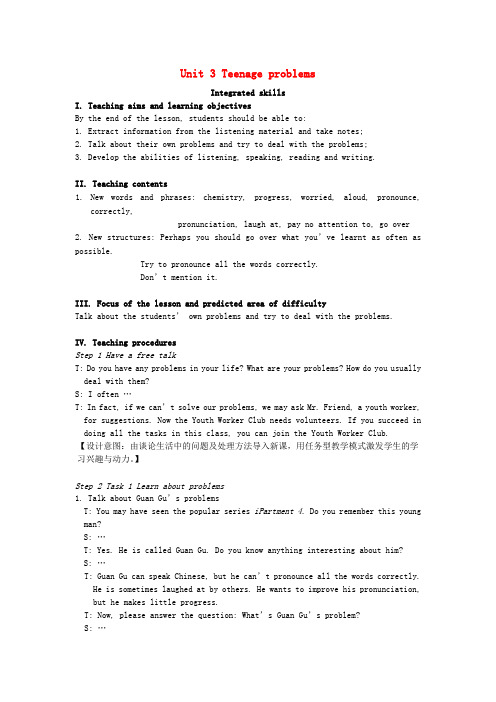
Unit 3 Teenage problemsIntegrated skillsI. Teaching aims and learning objectivesBy the end of the lesson, students should be able to:1. Extract information from the listening material and take notes;2. Talk about their own problems and try to deal with the problems;3. Develop the abilities of listening, speaking, reading and writing.II. Teaching contents1.New words and phrases: chemistry, progress, worried, aloud, pronounce,correctly,pronunciation, laugh at, pay no attention to, go over 2. New structures: Perhaps you should go over what you’ve learnt as often as possible.Try to pronounce all the words correctly.Don’t mention it.III. Focus of the lesson and predicted area of difficultyTalk about the students’ own problems and try to deal with the problems.IV. Teaching proceduresStep 1 Have a free talkT: Do you have any problems in your life? What are your problems? How do you usually deal with them?S: I often …T: In fact, if we can’t solve our problems, we may ask Mr. Friend, a youth worker, for suggestions. Now the Youth Worker Club needs volunteers. If you succeed in doing all the tasks in this class, you can join the Youth Worker Club.【设计意图:由谈论生活中的问题及处理方法导入新课,用任务型教学模式激发学生的学习兴趣与动力。
江苏省九年级英语上册《Unit 3 Teenage problems》课
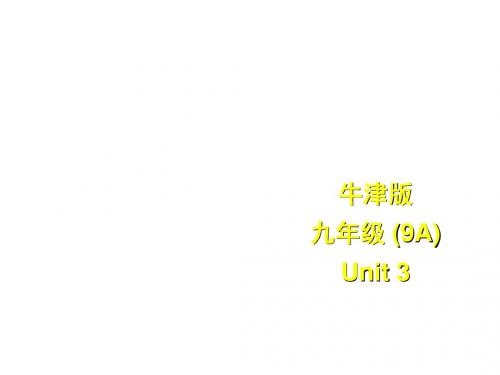
She ___ca_n__n_o_t_r_u_n_f_a_s_t__ and _h_a_t_es__s_w_i_m_m__in__g_. Also, her classmates call her a __b_o_o_k_w_o_r_m____. This makes her feel sad. I told her what to do in PE lessons. She should just __tr_y__h_e_r_b_e_s_t__ and __en__jo_y__th__e_e_x_e_r_ci_s_e__. I also told her to _p_a_y__n_o_a_t_t_e_n_ti_o_n__to_ the students who laugh at her.
Sue Wang My English name is Sue. I am a Grade 9 student and I am very clever. I love English, Maths and Science. I study hard and I always do well in exams. I am the top student in my class. However, I am not very good at sport. I cannot Sport. I cannot run fast and I hate swimming.
Does Amy think Millie’s penfriend is too busy to write e-mails? Yes. What advice does Amy give Millie? Millie should send an e-card to her penfriend and let her know she misses her very much.
九年级英语上册 Unit 3 Teenage problems Integrated skills课

Congratulations! You have succeeded in doing the tasks! You can join the Youth Worker Club!
By Mr Sigmund Friend
Homework
1. Oral work: Talk about your problems.
Task 3 Try to deal with problems
Group work
Make a survey about students’ problems.
Not having enough sleep Getting too many tests and exams Getting low marks in exams Having no close friends Being laughed at by the classmates …
Unit 3 Teenage problems Integrated skills
Free talk
Do you have any problems in your life? What are your problems? How do you deal with them?
The Youth Worker Club needs volunteers. If you succeed in doing all the tasks in this class, you can join the Youth Worker C’s made little progress in his English.
He should go over what he has learnt as often as possible.
九年级英语上册 Unit 3 Teenage problems Integrated skills极

Unit 3 Teenage problems Integrated skills教学目标:1. 能从听力材料中获取相关信息来完成笔记。
2. 能正确地看待自己的问题,找到合适的解决方法。
重点重点:听力技巧指导。
重点句子:I’ve made little progress in my English.Perhaps you should go over what you’ve learnt as often as possible. Try to pronounce all the words correctly.Don’t mention it.【课前导学】:1. What problems do you have?______________________________________________________________________________ 2. Do you have any good ideas to deal with them?_______________________________________________________________________________ ______________________________________________________________________________ 【课堂练习】:Step 1. Speak up1. Talk about your own problems.2. Read the conversation and answer the questions.3. Learn some useful expressions, then make new conversations.Step 2. Listening.3. Listen to Part A2,choose the correct answers:( ) Nora isn’t good at sports, because she________.A. can run fast.B. can’t swim fast.C. dislikes swimming.D. doesn’t enjoy the exercise.( ) Why doesn’t Nora have any good friends? Because _________.A. she isn’t friendly.B. she is a bookworm.C. she doesn’t like to study.D. h er classmates laugh at her.( ) Which of the following suggestion is NOT true?A.Talk to your best friend when feeling sadB. Share your problems with your best friendC. Pay attention to those students who laugh at youD. Be proud of your schoolwork4. Listen again, complete Part A2 on Page 43.5. Finish Part A3.Ste p 3 Language points:1. I’m very worried. 我非常担心。
初中英语备课参考 Teenage problems

Unit3 Teenage problemsComic strip &Welcome to the unit青少年的问题。
Teenage, adj. “十来岁的”,主要指十三岁到十九岁这个年龄段的。
e.g. They are teenage children. 他们是十几岁的孩子teenager, n. “十来岁的青少年”【即时体验】试着翻译下面的句子He joined a club for teenagers.答案:他参加了一个青少年的俱乐部。
2. I’m getting fat. Look at my stomach. 我正在发胖,看我的肚子。
get 在这里是一个连系动词,与形容词一起构成系表结构。
e.g. He got tired after the long walk.连系动词除be动外,还有感官动词:look, sound, smell, taste, feel,还有三个“变”,即:get, turn, become等e.g. The cake tastes good.【即时体验】试着翻译下面的话What’s wrong? You look unhappy today.答案:怎么了?你今天看上去不开心。
3. Eating too much makes you unhealthy. 吃得太多使你不健康。
eating too much 动名词短语做主语e.g. Running and swimming are good for you.4. The TV is always on at my home. 我家的电视机总是开着。
on 指机器或电气工作或运转着,它的反义词是off,用作副词。
例如:It’s so dark, please turn on the light.这么暗,请把灯打开。
【即时体验】试着翻译下面的句子:当你离开家时请关掉电视。
答案:Please turn off the TY when you leave home.5. Sometimes, I feel lonely. 有时我感到孤独。
九年级英语上册 Unit 3 Teenage problems Integrated skills课件 (新版)牛津版(1)
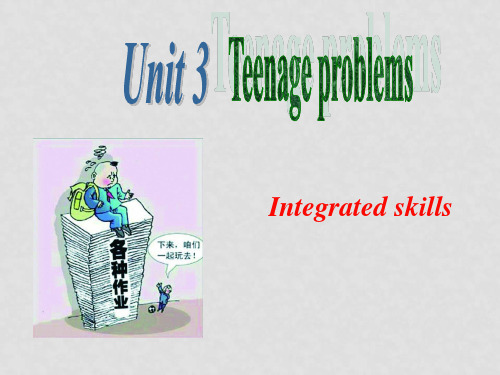
suggestions
share her problem with... Pay no attention to those.. be proud of ...
Task 4: Help Mr Friend complete the report :
Nora is one of thet_o_p_s_t_ud_e_n_t_s in her class at Sunshine Middle school. Her favourite subjects are _E_ng_l_is_h___, _M_a_t_h_s____ and _C_h_e_m_is_t_r_y_.
Problems: She likes reading books, just like a_b_o_o_k_w_o_rm_. She hasn't found her father, so she feels sad and _w_o_r_ri_e_d_.
Advice: Why don't you share your problem with your friends?
Advice: Maybe you should ask Xiao Yanzi for help.
laugh at make little progress in
go over pay no attention
bookworm worried pronounce
pronunciation
Task 1: Listen to A1 and put a tick : Listen to Nora's information and put a tick!
Integrated skills
九年级英语上册 Unit 3 Teenage problems Period 4 Integrate
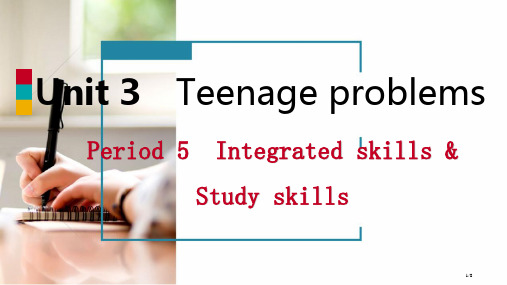
Period 5 Integrated skills & Study skills
1/8
Period 5 Integrated skills & Study skills
重点单词
1.chemistry n. 化学 2.bookworm n. 书虫,书呆子 3.progress n. 进展,进步 4.worried adj. 担心,烦恼 5.aloud adv. 大声地;出声地 6.pronounce vt. 发音
4/8
Period 5 Integrated skillபைடு நூலகம் & Study skills
7.make little progress 几乎没有取得进步 8.as often as possible 尽可能经常地 9.try to do sth 尽力做某事 10.don't mention it 不客气 11.make friends 交朋友 12.move to… 移居到……
8/8
5/8
Period 5 Integrated skills & Study skills
重点句型
1.I also told her to pay no attention to the classmates who laugh at her. 我还告诉她不要在意嘲笑她同学。
2.Now Nora seems much happier than before. 现在诺拉似乎比以前高兴多了。
6/8
Period 5 Integrated skills & Study skills
3.Perhaps you should go over what you've learnt as often as possible. 可能你应该尽可能经常地复习你所学东西。
九年级英语上册《Unit 3 Teenage problems Integrated skills》教案

Unit3 Teenage problemsIntegrated skillsTeaching goals:1.知识目标:学习词汇:chemistry, progress, worried, aloud, pronounce, correctly, pronunciation, mention, bookworm学习词组: the top students, get high marks in exams, laugh at, share your problems wi th sb., pay no attention to, be proud of, make her feel bad,make little progress, go over, read English aloud, pronounce all the words correctly,学习句子:I’ve made little progress in my English.It takes time.Perhaps you should go over what you have learnt as often as possible.Try to pronounce all the words correctly.Don’t mention it.2. 技能目标:1)从一个学生的情况介绍中获得信息并作记录。
2)能听懂有关如何处理问题的对话,并从听力材料中获取需要的信息。
3)能用从听力中获取的信息完成一份谈话记录。
3. 情感目标:学会谈论个人问题并提供建议。
Important and difficult points:知识目标 + 技能目标听力能力的提高Teaching procedures:Step1:预习指导与检测见导学案Step2:展示目标见导学案Step3:课堂导学与互动任务一:检查预习作业。
Ask:How can we live a h appy lif e? What can we do to live a happy life?任务二:听力。
江苏省苏州市高新区第三中学校九年级英语上册 Unit 3 Teenage problems Integrated skills教案 .doc

1. Ask the students to complete the report.
2. Check the answers in groups.
3. Read the report aloud.
Step 6 Speak up
1. Everybody has problems that worry them. Daniel is very worried these days because his English isn’t very good. He’s asking Millie for advice now. Listen to the conversation and learn some new words.
2. Read the conversation and answer the questions.
1) What is Daniel’s problem?
He has made little progress in his English.
2) What advice does Millie give Daniel?
Teaching methods:Listening, speaking and co-operative approach
Teaching procedures:
Step 1 Revision
Revise the problems ss have and how to solve t hem.
Step2.Presentation
following on thSubject I like:
Subject I don’t like:
3. Write the answers to these questions. Then ask the students to write a
9A Unit3 Teenage problems Integrated skills(共37张PPT)

4. Try to pronounce all the words correctly. 努力把所有单词读正确。 correctly adv. 正确地 correct adj. 正确的; 恰当的 the correct answer 正确答案 v. 改正; 纠正 correct mistakes 改正错误
Second problem: only a few ______, friends classmates laugh at her and call her a bookworm. Advice: talk to your __________ best friend when feeling sad and share problems with her
2. I feel like…
3. I’m worried about…
Asking for help
1. Can you give me some advice? 2. What do you think? 3. Can you help me? 4. What should I do?
5. What’s your suggestion?
2. Perhaps you should go over what you’ve learnt as often as possible. 也许你应该尽可能多地复习你已经学 习过的知识。 go over 复习; 回顾 e.g. Go over the text before the exam. 考试前复习课文。
3.
aloud/loud/loudly
aloud是副词, 与read, think 连用时, 表示 “出声读”或“把想到的自言自语地说出 来”, 不涉及声音的大小。当aloud与shout 等词连用时, 才表示“大声地”。它通常 放在动词之后, 没有比较级和最高级形式。 例如: Don’t read aloud in the reading room.
- 1、下载文档前请自行甄别文档内容的完整性,平台不提供额外的编辑、内容补充、找答案等附加服务。
- 2、"仅部分预览"的文档,不可在线预览部分如存在完整性等问题,可反馈申请退款(可完整预览的文档不适用该条件!)。
- 3、如文档侵犯您的权益,请联系客服反馈,我们会尽快为您处理(人工客服工作时间:9:00-18:30)。
Unit 3 Teenage problems
一、短语互译。
1. 尖子生之一________________
2. 享受锻炼的乐趣________________
3. 嘲笑 ______________________
4. 不理睬_______________________
5. 看上去高兴 __________________
6. 在…取得进步_________________
7. 尽可能经常地_________________8. read English aloud_____________
9. call sb a bo okworm.. _____________10. pay attention to.. _____________
11. be proud of____________________12. find sth difficult ______________
13. go over____________________ 14. reply to …__________________
15. Thank s for…______________________
二、单项选择。
( )1.We usually get________ homework to do every day.
A. too many
B. many too
C. too much
D. much too
( )2.Some s tudents have difficulty out that Maths p roblem.A. work B. works C. working D. worked
( )3.Mum told me computer games from Monday to Friday.
A. not to play
B. don't play
C. doesn't play
D. to not play
( ) 4. We can’t work out the Physics problem. Can you tell us __________ ?
A. how to do
B. what to do it
C. how to do it
D. what to do
( )5.They were afraid___________English with the exchange students.
A.to practice to speak
B.to practice speak
C.of practicing to speak
D.of practicing speaking
三、用括号所给的词的适当形式填空。
1. It's ___________ (help) for them to make a list of the things they need to do
2. _____________ (first), we should solve this problem.
3. — Thank you very much. — It's my __________. (please).
4. A (health) diet is very important to our health.
5. People in South China __________________(suffer)from the flood now.
6. We should think a better way _______________ (solve) this problem.
7.You should pay attention to the _______________ (spell)mistakes.
8.We had over 100________(reply)to our advertisement.
9. Only one of these books is worth ______ (read).
10.________________(play)sports can help them ______________(relax).
11. It’s cold in the room. Let’s make a fire ______________(keep)us warm.
12. Please don’t be ______________ (worry)about me.
13.This makes her ___________(fe el)sad.
14.Sue seems much __________ (happy)than before.
四、根据句子意思,从方框中选用恰当的词或短语填空。
1. How can we _________________ the p roblem?
2. _________________ giving me such valuable advice.
3. ________did you send the e-mail______? — To ask Amy some questions.
4. The famous editor always ______________ the readers as soon as possible.
5. You can ____ Mr Wu ___ at any time. He is glad to help all of us.
五、完形填空
Jenny is a student in Hangzhou now. She moves(搬家) to this 1 with her family, 2 Hangzhou is a beautiful place and they like it very much. They are very pleased with their 3 in Hangzhou. The city is beautiful and clean. The people are kind and 4 to t hem. Now Jenny’s parents work 5 a bank and Jenny 6 at a great middle school. Everything is going 7 . But there is a big problem. They don’t like the 8 in Hangzhou. Jenny said, “It’s too hot in summer while too cold in winter. On hot days, I have to stay at home. When it’s very cold, it often 9 . I can’t go out to play, either(也). That’s really 10 .
1. A.city B.country C.school D.capital
2. A. but B.beause C.so D.or
3 . A.work B.life C.study D.sports
4. A.sad B.surprised C.relaxed D. friendly
5. A.on B.in C.under D.to
6. A.stays B.studies C.works D.swims
7. A.good B.best C.well D.beautiful
8. A.people B.hospital C.food D.weather
9. A.rain B.rainy C.is raining D.rains
10. A.great B.scary C.terrible D.exciting。
